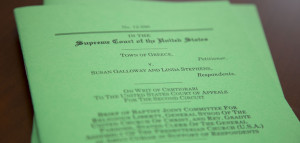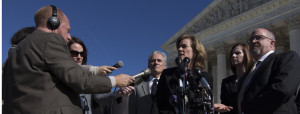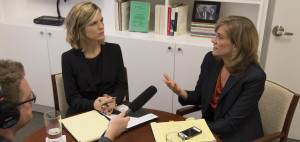Baptist Joint Committee brief cited in Kagan dissent
FOR IMMEDIATE RELEASE
Contact: Cherilyn Crowe | Phone: 202-544-4226 | Cell: 202-603-1663 | [email protected]
May 5, 2014
WASHINGTON – A divided U.S. Supreme Court ruled that official prayers opening local municipal meetings may be constitutional, finding them consistent with the historic tradition of chaplain-led prayers before Congress and state legislatures.
The 5-4 decision in Town of Greece v. Galloway reverses the 2nd U.S. Circuit Court of Appeals and upholds the prayer practice of the Town of Greece, N.Y., despite marked differences between the town’s practice and the one upheld by the Court in Marsh v. Chambers (1983) and practiced in Congress.
The Baptist Joint Committee for Religious Liberty filed a friend-of-the-court brief in the case, opposing the town’s practice of opening municipal meetings with prayer, saying the practice violates the conscience of those who have to be in attendance to participate in the meeting. The Court, however, referred to the “ceremonial” prayers at the beginning of a legislative session offered by invited clergy as compatible with the Establishment Clause based upon historical precedent.
“While the Court ruled for the town under the historic tradition of ceremonial prayer for lawmakers, local governments can – and should – take steps to ensure that citizens are not forced into religious acts at a government meeting,” said K. Hollyn Hollman, general counsel of the Baptist Joint Committee. “It is hard to square a government-led religious practice in a local municipal meeting with the Constitution’s guarantee of equal rights of citizenship without regard to religion.”
As cited in Justice Elena Kagan’s dissent, the BJC brief says the practice infringes the liberty of conscience of those in attendance. Kagan wrote that the prayer-givers in Greece “appear almost always to assume that everyone in the room is Christian (and of a kind who has no objection to government sponsored worship).” Her footnote points out that the BJC brief says “many Christians believe … that their freedom of conscience is violated when they are pressured to participate in government prayer, because such acts of worship should only be performed voluntarily.”
While the 2nd Circuit held the town’s practice unconstitutional because a substantial majority of the prayers contained “uniquely Christian language,” the Supreme Court noted the lack of intentional discrimination against non-Christians and rejected the challengers’ argument that the Marsh decision contains an implicit ban on sectarian references in official prayers, stating that the prayers are not likely to create a constitutional violation “[a]bsent a pattern of prayers that over time denigrate, proselytize, or betray an impermissible government purpose.”
While the justices were divided on the significance of particular facts, the decision does not create a new constitutional test for evaluating a prayer practice in a government forum. Writing for the majority, Justice Anthony Kennedy stated, “A test that would sweep away what has so long been settled would create new controversy and begin anew the very divisions along religious lines that the Establishment Clause seeks to prevent.”
The BJC brief says the First Amendment’s Establishment Clause protects the rights of individuals and faith communities to engage in religious worship as a voluntary expression of individual conscience and prohibits the government from appropriating those rights. The Founders and our Baptist forebears understood “that prayer is an expression of voluntary religious devotion, not the business of the government,” according to the brief.
The BJC brief was joined by the General Synod of the United Church of Christ and the Stated Clerk of the General Assembly of the Presbyterian Church (U.S.A.).
-30-
The Baptist Joint Committee is a 78-year-old, Washington, D.C.-based religious liberty organization that works to defend and extend God-given religious liberty for all, bringing a uniquely Baptist witness to the principle that religion must be freely exercised, neither advanced nor inhibited by government. The BJC has filed amicus curiae briefs in more than 100 cases in the courts, including most of the U.S. Supreme Court’s cases dealing with religious liberty.
Here are links to additional resources on the case from the Baptist Joint Committee:

BJC amicus brief in Town of Greece v. Galloway

General Counsel Holly Hollman: Legal and practical implications of Greece v. Galloway

Blogger Don Byrd: 7 things to know about the decision

Podcast preview with General Counsel Holly Hollman & Staff Counsel Nan Futrell
A recap of oral arguments from BJC General Counsel Holly Hollman
An examination of legislative prayer practices generally from BJC Staff Counsel Nan Futrell
For media requests, contact:
Cherilyn Crowe, director of communications
[email protected]
Office: 202-544-4226 ext. 305
Cell: 202-603-1663




